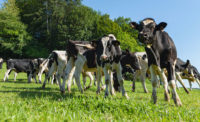Denver ordinance would ban slaughterhouses
If passed, Denver’s Initiated Ordinance 309 would shutter a Superior Farms facility that accounts for 15% to 20% of US lamb processing capacity.

Photo credit: Superior Farms
Activists behind the proposed ordinance in Denver see it as a test case for similar measures elsewhere, says Superior Farms Director of Marketing Bob Mariano.
Voters in Denver will decide the fate of an ordinance that would ban slaughterhouses in the city.
The measure — Denver’s Initiated Ordinance 309 — will appear on the Nov. 5 ballot. The wording for the initiative that will appear on the ballot reads:
- Shall the voters of the City and County of Denver adopt an ordinance prohibiting slaughterhouses, and, in connection, beginning January 1, 2026, prohibiting the construction, maintenance, or use of slaughterhouses within the City; and requiring the City to prioritize residents whose employment is affected by the ordinance in workforce training or employment assistance programs?
The measure is of particular concern for Superior Farms, a leading supplier of US lamb products, which operates a slaughter facility in Denver. Bob Mariano, director of marketing for Superior Farms, shares some background on the proposed ordinance and what it would mean for Superior Farms, US lamb production and stakeholders across the US meat industry.
What is Denver’s Initiated Ordinance 309, and what does it mean not just for Superior Farms but also to the meat processing industry as a whole?
Bob Mariano: The slaughterhouse ban on the ballot in Denver this November unfairly targets a single employee-owned business and forces 160 employees out of a company they own. Banning a single Denver business won’t improve animal welfare, but it will have devastating consequences for the local economy and increase food prices. The community did not ask for this ban. It is being propped up by out-of-state animal liberation activists who have a stated goal of “reverse the cultural norm of eating animals.” They are running a dishonest dark-money campaign and face a campaign finance complaint for refusing to disclose their funders. Ordinance 309 in Denver will not just impact the city’s only slaughterhouse. Campaign leaders and spokespeople have repeatedly called their campaign a test or a “pilot” and that “this campaign isn't about getting slaughterhouses out of Denver. This campaign is about a big, bold, transformative step away from animal agriculture”.
What would be the lamb market impact if voters approve Initiated Ordinance 309?
Bob Mariano: The Superior Farms facility in Denver accounts for 15% to 20% of lamb processing capacity in the US and is a major producer of Halal-certified meat, which is based on humane treatment throughout the entire lifecycle of the animal in accordance with Muslim religious traditions. Closing Denver’s only slaughterhouse would have devastating consequences for the local economy and food prices, as well as environmental impacts. Many Denverites will continue eating meat even if local production is banned, which means shipping more of Denver’s food supply from further away. The additional cost of shipping in meat from out of state will be passed on to consumers, increasing food prices and unfairly burdening low-income families. It would also have environmental impacts, increasing carbon emissions and making our local food supply chain less sustainable. In addition to producing 100% Halal-certified meat, the Denver facility was designed in consultation with world-renowned animal welfare expert Temple Grandin. USDA inspectors are on-site at all times and it is routinely inspected by other independent animal welfare auditors. If Superior Farms is forced to close via ballot measure, we can’t predict where these animals would be sent for processing, or whether those facilities would uphold the same humane standards as our facility does. Finally, 160 workers at Denver’s only slaughterhouse will lose their jobs and benefits if this ban passes. And according to a recent Colorado State University study, it could threaten more than 2,700 jobs including independent ranchers, truckers, distributors, retailers, butchers, and restaurant owners and employees.
What support has Superior Farms received from other sectors in the meat industry (local, state and national) regarding efforts to address Initiated Ordinance 309?
Bob Mariano: We’ve received strong support from all levels of the meat industry, including the American Sheep Industry Association, the Colorado Cattlemen’s Association, Colorado Farm Bureau, Colorado Livestock Association, Colorado Wool Growers Association, EatDenver, Meat Institute, Mile-Hi Cattlewomen, National Western Stock Show, National Pork Producers Council, Rocky Mountain Bison Association, Rocky Mountain Farmers Union. You can see our full endorsements at https://stopthebanprotectjobs.com/endorsements/.
What steps has Superior Farms taken to inform the public about the economic impact the ordinance would cause?
Bob Mariano: The slaughterhouse ban will have devastating consequences for Denver’s economy, as shown in the above-mentioned CSU report, which found that the ban could cost our economy up to $861 million and threaten more than 2,700 jobs. The No On 309 campaign has done outreach to local, regional, and national reporters, and helped workers connect with the media to interview and share their stories about what the ban would mean for them.
What recourse is available to Superior Farms if voters approve Initiated Ordinance 309?
Bob Mariano: While it isn’t clear which agency would enforce the ban, there is no recourse available to stop it, if approved. Ordinance 309 further misleads voters by creating the impression employee-owners who lose their jobs will be compensated. But there are no guarantees that they will get the help they need or any compensation at all. It is also very unlikely that workers would be able to find comparable pay, benefits, and employee-owner arrangements, making these jobs virtually impossible to replace if this ban forces Superior Farms to close.
Looking for a reprint of this article?
From high-res PDFs to custom plaques, order your copy today!
.png?height=96&t=1647275041&width=96)






